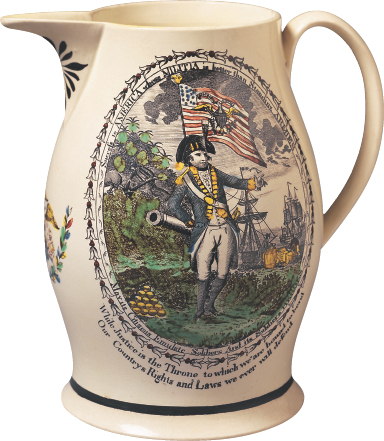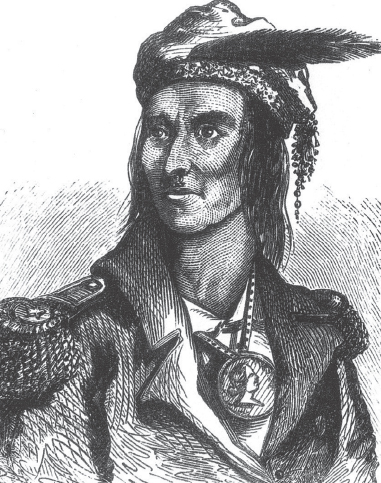Republicans in Power, 1800–1824

Printed Page 232 Chapter Chronology
Republicans in Power, 1800-1824

QUICK START
Quickly learn what is important in this chapter by doing the following:
- READ the Chapter Outline to see how the chapter is organized.
- SKIM the Chronology to see what will be covered.
When you are ready, download the Guided Reading Exercise, then read the chapter and the Essential Questions for each section and complete the Guided Reading Exercise as you go. Then use LearningCurve and the Chapter Review to check what you know.
The name Tecumseh translates as "Shooting Star," a fitting name for the Shawnee chief who reached meteoric heights of fame among Indians during Thomas Jefferson's presidency. From Canada to Georgia, Tecumseh was by all accounts a charismatic leader. Graceful, eloquent, compelling, astute: Tecumseh was all these and more, a gifted natural commander, equal parts politician and warrior.
The Ohio Country, where Tecumseh was born in 1768, was home to some dozen Indian tribes. During the Revolutionary War, the region became a battleground, and Tecumseh lost his father and two brothers to American fighters. The Revolution's end in 1783 brought no peace to Indian country. The youthful Tecumseh fought at the battle of Fallen Timbers, a major Indian defeat, and stood by as eight treaties ceded much of Ohio to the Americans between 1795 and 1805.
Some resigned Indians looked for ways to accommodate, taking up farming, trade, and intermarriage with white settlers. Others spent their treaty payments on alcohol. Tecumseh's younger brother Tenskwatawa led an embittered life of idleness and drink. But Tecumseh rejected accommodation and instead campaigned for a return to ancient ways. Donning traditional animal-skin clothing, he traveled around the Great Lakes region persuading tribes to join his pan-Indian confederacy. The territorial governor of Indiana, William Henry Harrison, admired and feared Tecumseh, calling him "one of those uncommon geniuses which spring up occasionally to produce revolutions."

Even Tecumseh's dissolute brother was born anew. After a near-death experience in 1805, Tenskwatawa revived and recounted a startling vision of meeting the Master of Life. Renaming himself the Prophet, he urged his many Indian followers to regard whites as children of the Evil Spirit, destined to be destroyed.
President Thomas Jefferson worried about an organized Indian confederacy and its potential for a renewed alliance with the British in Canada. Those worries became a reality during Jefferson's second term in office (1805–1809). Although his first term (1801–1805) brought notable successes, such as the Louisiana Purchase and the Lewis and Clark expedition, his second term was consumed by the threat of war with either Britain or France, in a replay of the late-1790s tensions. When war came in 1812, the enemy was Britain, bolstered by a reenergized Indian-British alliance manifested in battles along the Canadian-U.S. border. Among the causes of the war were insults over international shipping rights and the capture of U.S. vessels, along with unresolved tensions with Indians in the Northwest and Southwest.
In the end, the War of 1812 settled little between the United States and Britain, but it was tragically conclusive for the Indians. Eight hundred warriors led by Tecumseh helped defend Canada against U.S. attacks, but the British did not reciprocate when the Indians were under threat. Tecumseh died on a Canadian battlefield in the fall of 1813. No Indian leader with his star power would emerge again east of the Mississippi.
Tecumseh's briefly unified Indian confederacy had no counterpart in the young Republic's confederation of states, where widespread unity behind a single leader proved impossible to achieve. Republicans did battle with Federalists during the Jefferson and Madison administrations, but then Federalists doomed their party by opposing the War of 1812. The next two presidents, James Monroe and John Quincy Adams, congratulated themselves on the Federalists' demise and Republican unity, but in fact divisions within their own party were extensive. Wives of politicians increasingly inserted themselves into this dissonant mix, managing their husbands' politicking and enabling them to appear above the fray and maintain the fiction of a nonpartisan state. That it was a fiction became sharply apparent in the most serious political crisis of this period, the Missouri Compromise of 1820.